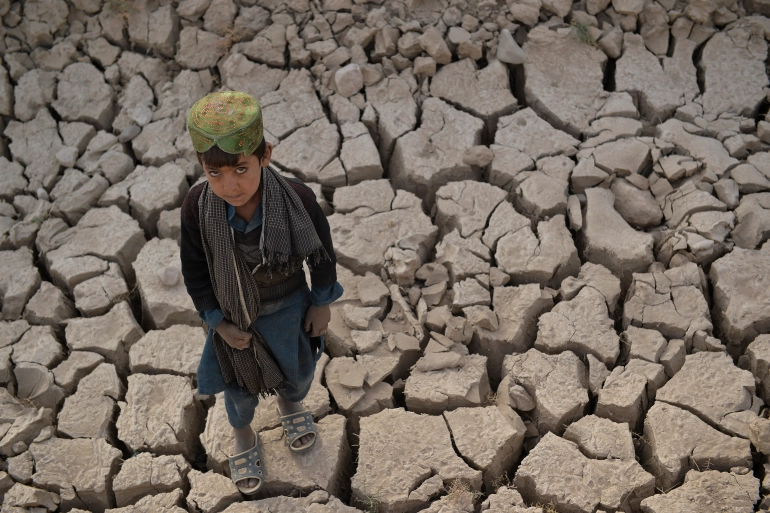Afghan climate activist Abdulhadi Achakzai was the only representative of his country at the United Nations COP27 climate conference held recently in the Egyptian resort city of Sharm El-Sheikh.
The South Asian nation was excluded from the summit, as the country has remained diplomatically isolated since the Taliban recaptured power last August after 20 years.
As the climate summit kicked off on November 6, the UN mission in Afghanistan called for urgent collective climate action, saying the country is “one of the least prepared against climate shocks”.
It added that Afghanistan is the sixth most affected in the world by climate-related threats, with the country facing frequent droughts, flash floods and landslides affecting livelihoods and infrastructure.
Achakzai, the unofficial representative of his country at the international summit, took the opportunity to educate delegates about the climate crisis in Afghanistan and bring the issue to the agenda of participants.
Experts have blamed climate change for the frequent natural disasters in the country, and are calling for international funding to address the problem.
“I would stop everyone I met and ask them: ‘Have you heard about Afghanistan?’ I would then tell them about the situation in our country, the suffering of our people because of climate change,” said Achakzai, who is director of the Environmental Volunteer Network (EVN), an NGO based in the capital Kabul.
The non-profit works to bring awareness and training on climate issues across the county.
“Everyone seems to agree with me when I said that Afghanistan is among the most vulnerable countries affected by climate change, but few were willing to take action,” Achakzai said.
Funds have dried up
International organisations and stakeholders remain wary of engaging with the Taliban, which currently runs the country of 38 million. Funding for both developmental and climate projects has dried up because of international sanctions.
The Taliban expressed its disappointment at being excluded from COP27 during a press conference on November 10.
“Climate change has no national boundaries and the issue should not have been politicalised,” Hafiz Aziz Rahman, the acting head of Afghanistan’s National Environmental Protection Agency (NEPA), said, criticising Afghanistan’s exclusion from the conference.
Rahman highlighted the frequent droughts ravaging Afghanistan despite the country playing hardly any role in causing climate change.
Ramiz Alakbarov, deputy special representative of the UN Secretary-General for Afghanistan, agreed with the need for urgent attention to the country’s climate woes.
“Action for Afghanistan is needed now. We cannot wait. Afghans do not have time to wait. It will take all sides finding common ground and common cause to work towards a sustainable future for Afghanistan,“ Alakbarov said.
“We also have to be clear: this problem is not specific to Afghanistan. It is a larger regional issue and not acting in Afghanistan now will create a considerable setback in climate action for the entire region.”
But international funding for climate solutions in Afghanistan has dwindled drastically since last year.
The Afghan environment agency, NEPA, revealed in August that the international community had halted 32 environmental protection projects worth $805m since the Taliban takeover.
The Afghan academic and scientific community are, meanwhile, warning of dire consequences for excluding Afghanistan from the dialogue on climate strategy.
“Some of the immediate climate concerns are frequent droughts and flash floods, followed by forest fires, [and] glaciers’ shrinkages,” pointed out Najibullah Sadid, an Afghan climate scientist and associate researcher at the University of Stuttgart in Germany.
Sadid added that since most Afghans rely on agriculture for sustenance and the economy, climate change-induced droughts and floods have been significantly impacting livelihoods, aggravating food insecurity in the country.
According to data recorded by the UN’s Office for the Coordination of Humanitarian Affairs, more than 223,000 Afghans were affected by natural disasters throughout Afghanistan this year alone. Meanwhile, Save the Children estimates that nearly 13 million children will be affected by extreme weather events including droughts and floods.
The impact of climate change will further aggravate the situation in the country which faces a dire humanitarian crisis and an economic collapse.
Experts have also emphasised the need for climate adaptation as Afghanistan has seen a temperature rise of 1.8°C between 1950 and 2010 – twice the global average.
“It is important [that] we look at life-saving adaptation mechanisms such as expanding irrigated agricultural area that has the resilience to the drought,” said Mohammad Assem Mayar, water management expert and lecturer at Kabul Polytechnic University.
But experts say a lack of international funding is a major impediment in Afghanistan’s fight against climate change.
“There is a need to increase the steadily declining climate change adaptation funds which can be transferred to Afghanistan through the existing cash transfer mechanisms,” Mayar suggested, referring to methods employed by international agencies due to the sanctions.
Climate adaptation funding refers to support for specific projects that help local communities adapt to their changing environment. “For instance, aside from expanding irrigated agricultural areas, the impact of drought can be reduced by the construction of small reservoirs, and introducing water-saving technologies,” Mayar said. “Similarly, for floods, diversion dams, watershed management and several small reservoirs could help reduce flow peak.”
He implored the international community to resume projects through UN agencies to reach rural communities that are severely affected by climate change.
“Isolating Afghanistan will mean punishing its people, which is not fair,” Mayar said. “Climate change isn’t going to stop, and without adaptation support, it is akin to gradually pushing the Afghan people towards a death sentence.” (The article was originally published by ALJAZEERA)











